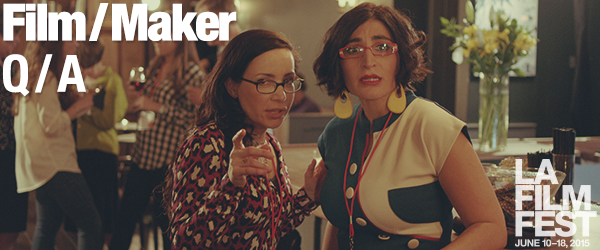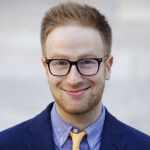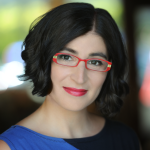How a Freaky Week in NYC Inspired an Indie Rom-Com—The Story Behind 3rd Street Blackout

Behind every (fill in the blank) great/glorious/funny/scary/sad story told on film is an equally great/glorious/funny/scary (yes, probably sometimes) sad story: the one about how the whole thing went from being an idea in a brain (probably many years ago) to a big screen premiere at a big-time Festival. In this Film/Maker Q/A blog series, our LA Film Fest programmers interview our LA Film Fest filmmakers to discover the stories behind the story.
Negin Farsad and Jeremy Redleaf, writers, directors and stars of 3rd Street Blackout, talked with Associate Programmer So Yun Um about their film, which also stars Janine Garofalo, John Hodgman and Ed Weeks. The story follows neuroscientist Mina and her hacker boyfriend Rudy, a picture-perfect, prototypical hipster couple who live, work and love across digital platforms. When Hurricane Sandy pummels the city and knocks out the power in their neighborhood, at first it is romantic. But when Rudy discovers an indiscretion that Mina kept secret, they must learn to navigate on analog terrain, or risk losing their relationship.


Is this a story that happened in real life?
Negin: We were both in the hurricane zone after Hurricane Sandy. I was actually dating a guy and I had a relationship that was intensified because of the black out and I live on 3rd Street. And some of the characters [are based on real people]–like the chill master across the street is a real guy who’s played by Arthur French but the real chill master is a guy who appears in the film and says hello to the chill master. The guy at the card shop that I go to all the time plays the father of the actor who runs the card shop. There are real life people from the neighborhood. The band lives in my building and what not.
Jeremy: These things happened in a matter of speaking and all these things inspired this [film]. It was the first time I talked to my neighbors and became friends with all these new people when we had to borrow some ice or some wine. And when we started talking about the movie, we saw how the hurricane and blackout was so damaging, but there was this silver lining that showed us how we could be and how we want to be in an alternate universe.
Negin: Community building is so important to the film. As a former academic, I was really into the work of Robert Putnam, a political theorist at Harvard who spoke about the dissolution of civic bond. That became the ideological underpinning of the movie. We are experiencing the dissolution of civic bonds for various reasons. One of them is the internet and how we envision the world in which we reconnect with the community.
Jeremy: Negin and I are both digitally savvy, and we both are tethered to our phones and part of this is a meditation on that.
There is a distinct millennial feel to this film that focuses heavily on tech, the hipness of the New York scene and just generally the lives of these people. Were you conscious of talking about this specific demographic without being dismissive of hipsters?
Jeremy: Hipsters get a bad rap. When people think about [hipsters, they usually think] of people who are ironically detached and that’s not who we are or who are friends are. And so it wasn’t about making jokes–even though we did take some stabs at Brooklyn–but in terms of the characters, it’s about people who are early adopters of interesting and unique things.
Negin: In New York there are so many levels of hipsters that I feel like we’re on the middle of the spectrum and I think we’re on the lesser end—where we are self-aware of the hipster world. And we’re all around these technology startup-y, innovation-y people. Like in the TED world–there’s innovation genius, like, every other day and there is an intersection of the hipster and innovator that the film is trying to straddle.
These characters are rarely seen in media–where they live that hipster lifestyle and yet are involved in very lucrative, intellectual careers as computer coder and neuroscientist. Do you guys have experience or interest in these fields?
Negin: Part of the reason neuroscience was on my mind was because I am a TED fellow, which is bizarre because I am the only comedian among the TED fellows. I know an inordinate number of neuroscientists as a result. I went from knowing zero neuroscientists to knowing 10 neuroscientists. We got a neuroscientist from the TED community to be our consultant to talk about stuff he is working on and that made it to the talk I do in the film. Also what I learned from being around so many scientists is that they are more than this Big Bang Theory stereotype and they can be super funny, ridiculous and engaging. So I thought it would be fun to present that kind of character in a less stereotypical, nerdy way.
Jeremy: It was important for us to show characters who have awesome careers but not have it be about that. I do a lot of consulting and work in the tech and start-up space, and I code as well. The hack-a-thon in the film was the co-working space I am part of. So we tried to be as authentic as possible.
In this process of filmmaking and playing the main characters, what was the most challenging part?
Negin: I have experience juggling being in front of and behind the camera from my last film, which was a doc. I think the biggest drawback is that you shoot something and you want to watch it, but you have a ridiculous 14-hour day and you don’t have enough time. So you don’t feel like you’re getting the thing you want to get because you can’t review it, and you have 17-person crew on a shoestring budget and you gotta go. The challenge was relying on the article of faith.
Jeremy: You have to trust your collaborators. We had to put our trust in our cinematographer and our editor/producer, Andrew Mendelson, to be our eyes and ears. The hardest part for me was constantly going from being the most powerful person on set to the most vulnerable person on set. Back and forth. It was challenging to adjust from bearing my soul to calling action. We had to really trust each other and have challenging talks at times and constantly check with each other.
How did you divvy up the directorial responsibilities?
Jeremy: At times there was only one of us who was on camera, and in those moments the other person was calling the shots. When we were in a scene together, we had an inner circle of people who told us when we were sucking or straying from our vision. Everything else was pure collaboration.
During the hurricane, what was the one item that you chose to save or to take?
Jeremy: The thing I hoarded was CVS wine products, which were the only thing that wasn’t sold out. Lesson learned was to have a flashlight or to know where they are.
Negin: A lot of people were cavalier about it and I was one of them. I was like ‘I’m just going to buy a bucket of ice cream and wait it out and I’ll be fine.’ We had nothing and we just lit birthday candles. And if you think about the scale of the blackout, over 40 blocks of New York City was in the dark for five days. I was one of the people who thought something like that would never happen in New York City. One item that I found the most useful was my piano, which otherwise would be neglected. And it was so funny to know that this old timely thing that doesn’t require electricity brought immense pleasure and it was so central to my hurricane experience.
3rd Street Blackout is playing in the Festival’s US Fiction Competition on Saturday, June 13 at 4:45 pm and Monday, June 15 at 8:30 pm. Get your tickets here.
 So Yun Um / Los Angeles Film Festival Associate Programmer
So Yun Um / Los Angeles Film Festival Associate Programmer
So Yun Um is a Korean-American filmmaker & critic. She runs a film website and YouTube channel called So’s Reel Thoughts, writes the bi-weekly column Badass Femmes for Crome Yellow, and also programs for Los Angeles Asian Pacific Film Festival. The first time she watched Darren Aronofsky’s Requiem for a Dream, she instantly knew she wanted to pursue a career in film, whether it was critiquing or making, probably due to its extreme nature, which aligns with So’s equally fervent personality. She is particularly drawn to forward-thinking, edgy yet sensual, and diverse perspectives in film.